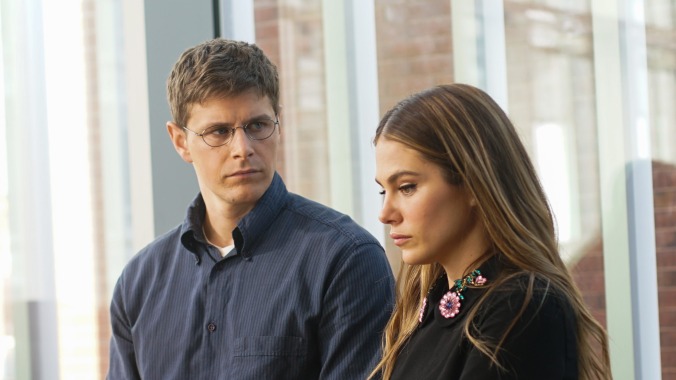Want a crash course in money laundering? The Fall Of The American Empire has you covered


Movies are starting to get creative about depicting the practical aftermath of stealing cash. Triple Frontier demonstrated, in exhausting detail, just how difficult it would be to transport millions of dollars from one location to another, given that casually renting a U-Haul isn’t an option. There are considerably fewer stacks of bills to be dealt with in The Fall Of The American Empire—only two duffel bags’ worth—but the movie turns out to be first and foremost an elaborate tutorial on money laundering, showing step by step how ill-gotten gains are moved offshore in order to avoid both detection and taxation. This emphasis gradually transforms what had appeared to be a noir-tinged thriller (with comic elements) into more of a dry lecture, especially when it becomes clear that writer-director Denys Arcand also means to make a pointed statement about all the good that could theoretically be done with millions of dollars. Still, at least he’s found another unique angle on the oft-told tale of a straight arrow stumbling onto an illicit fortune.
Here, our designated doofus is Pierre-Paul (Alexandre Landry), a former philosophy student first seen complaining to his girlfriend (Florence Longpré) that he’s too darn intelligent to be successful in today’s shallow, corrupt world. (She shrewdly dumps him on the spot.) His unexpected windfall arrives shortly thereafter: While working at his low-paying delivery job, he happens upon a robbery in progress during which everyone involved winds up dead or badly injured, leaving two bags of cash unattended on the street. Pierre-Paul impulsively tosses them into his delivery van before the police arrive, and quickly uses some of the money to order Montreal’s most expensive escort (Maripier Morin), in large part because she uses the nom de sex Aspasie (i.e., Aspasia, a notable figure in Greek philosophy). He actually does have some sense, though, and subsequently hires a career criminal, Sylvain “The Brain” Bigras (Arcand regular Rémy Girard), to “manage” his money. The three of them, assisted by a finance wiz (Pierre Curzi) who happens to be one of Aspasie’s former clients, struggle to stay one step ahead of both the cops (who correctly guess what’s happened) and the sadistic bad guys whose cash they need to render squeaky clean.
Arcand first made a splash over 30 years ago with The Decline Of The American Empire, a talky ensemble comedy about French-Canadian intellectuals. You’d think this would be a belated sequel, but the two films share only their deliberately ironic titles. (Arcand’s actual belated sequel to Decline was 2003's The Barbarian Invasions.) Pierre-Paul does at one point blame American capitalism for promoting avarice, and Arcand suggests that he’s the ideal person to wind up with a whole lot of what’s probably drug money; throughout the film, we see Pierre-Paul reflexively give money to the homeless, volunteer at soup kitchens, rail against income inequality. He’s a portrait of compassionate greed—someone who wants to be filthy rich in order to help others. That makes him easy to root for, but also faintly dull—especially as performed by Landry, who’s recessive to the point of nearly disappearing at times. Fall derives most of its energy from the dogged investigators (Maxim Roy and Louis Morissette) on Pierre-Paul’s trail, whose motives are murkier: professional zeal, or the hope of possibly skimming some of the seized cash?
For about an hour, Arcand keeps the plot moving briskly enough to at least partially disguise the film’s fundamentally didactic nature. He even pokes fun at his own use of genre clichés, having Aspasie and “The Brain” sarcastically comment on each other’s stereotypical function in various crime movies. But the basic setup requires enormous suspension of disbelief—would the police, arriving at the scene of a robbery-murder and finding only a delivery guy, really let him leave without first searching his van?—and the second half gets bogged down in the complicated minutiae of creating shell corporations and dummy bank accounts. Eventually, both characters and narrative start to feel like an elaborate pretext for what’s really, at heart, a documentary about the various ways that wealthy corporations avoid paying taxes, combined with an earnest public-service message about helping the homeless. Those are admirable goals, but springing them on viewers via an entertaining bait-and-switch risks inspiring disappointment, or even provoking resentment.